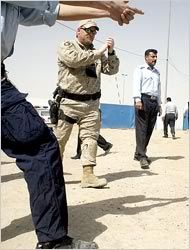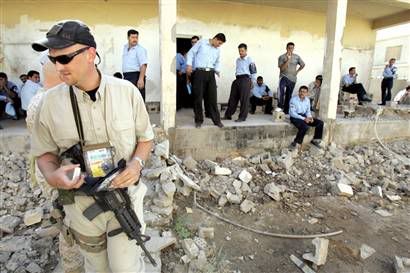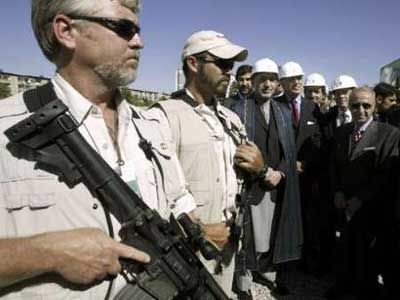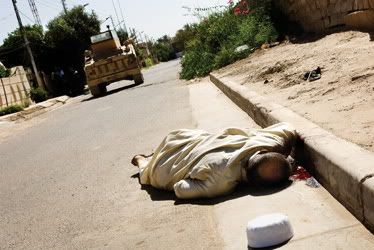
US missing billion-dollar Iraq contract
http://www.gulfnews.com/world/U.S.A/10162190.html
Washington: The State Department is unable to account for the $1.2 billion it gave to security firm DynCorp International to train Iraqi police, according to a government report on Tuesday.
"The bottom line is that State can't account for where it went," said Glenn Furbish, who contributed to the 20-page report for the Office of the Special Inspector General for Iraq Reconstruction.
The report said that Bureau of International Narcotics and Law Enforment Affairs (INL) "had not validated the accuracy" of invoices received prior to last October, and that the lack of controls "created an environment vulnerable to waste and fraud".
"Bills came in; they paid the bills, but they don't know what they paid for and they don't know what they've gotten," said Furbish, an accountant by training who spent two years in Iraq.
"It's like so much else that happened in Baghdad ... there was just a massive quantity of work and too few people in place to do it. They just essentially did not have the staff to monitor what was going on,” he said.
As a result, the audit agency announced it has suspended its oversight of the agency's project until the INL gathers the information.
The report coincides with a controversy over the use of private security firms in Iraq, particularly Blackwater USA, which is under scrutiny over a September 16 shooting incident in Baghdad in which 17 people were killed.
The Pentagon and the State Department are employing more than 7,000 security contractors in Iraq. US officials say they are needed to free up soldiers for other tasks.

Most of $1.2 billion to train Iraqi police unaccounted for
http://www.cnn.com/2007/POLITICS/10/22/dyncorp.spending/index.html?section=cnn_latest
The U.S. State Department is unable to account for most of $1.2 billion in funding that it gave to DynCorp International to train Iraqi police, a government report said Tuesday.
"The bottom line is that State can't account for where it went," said Glenn D. Furbish, who was involved in putting together the 20-page report for the special inspector general for Iraq reconstruction (SIGIR).
The Department of State's Bureau for International Narcotics and Law Enforcement Affairs (INL) "did not have the information needed to identify what DynCorp provided under the contract or how funds were spent," the report said.
As a result, the audit agency announced it has suspended its oversight of the agency's project until INL gathers the information.
"Their records are just not detailed," Furbish said Monday in a telephone interview. "From an audit perspective, we've identified the problem; they're working to rectify the problem."
Though Iraqi police have indeed been trained and equipment has been provided under the contract, invoices and supporting paperwork submitted by DynCorp "were in disarray," the report said.
In addition, INL "had not validated the accuracy" of invoices received prior to last October, and "INL does not know specifically what it received for most of the $1.2 billion in expenditures under its DynCorp contract for the Iraqi Police Training Program."
The lack of controls "created an environment vulnerable to waste and fraud," the report said.
Furbish, an accountant by training who spent two years in Iraq, added, "It's like so much else that happened in Baghdad ... there was just a massive quantity of work and too few people in place to do it. They just essentially did not have the staff to monitor what was going on.
"Bills came in; they paid the bills, but they don't know what they paid for and they don't know what they've gotten."
Furbish, who has carried out audits for the Government Accountability Office for three decades, said the projected time line of three to five years to rectify the problem "is not atypical" for U.S. projects carried out in Iraq since the ouster of President Saddam Hussein.
"Baghdad is its own arena," he said. "Contract control has been a major shortcoming across the board."
In addition to having too few properly trained people, problems arose from the difficulties inherent in traveling within Iraq and from "the rush to get reconstruction activities under way before we actually had a full structure in place to manage them," he said.
Asked whether the full structure is currently in place more than four years after the U.S.-led invasion, he said. "It continues to be a problem."
In a letter to SIGIR, INL Acting Assistant Secretary Elizabeth Verville said her agency has made "significant progress in correcting past contract management problems" and "is dedicated to addressing our past contracting problems and systematically strengthening contract management and oversight."
She said invoice processing delays will be reduced as staffing is beefed up in Baghdad.
State Department spokeswoman Susan Pittman said a number of reforms have been made since January. "We are committed to continuous improvement," she said.
The Washington-based staff of four will soon be increased to 11, and the Baghdad-based staff of five will be augmented to seven "as soon as they all have their clearances," she said.
Still, she acknowledged, it will take years to get the paperwork current. "It isn't an easy process," she said.
"There is a huge need, a huge, urgent need and there were not enough people to be able to fill that void," she said. "That is something that we are in the process of doing."
Gregory Lagana, a spokesman for DynCorp, said the company's work in Iraq is a "really complex program. ... We buy weapons, body armor, vehicles, communications equipment -- that all belongs to the State Department."
Sometimes, he said, "it's coded wrong or double-billed. We actually find a lot of that ourselves in the normal auditing process."
Tuesday's report is the second in a series of financial reviews ordered by Congress and carried out by SIGIR looking into large Iraqi Relief and Reconstruction Fund projects.
The first report, issued three months ago, criticized officials with the U.S. Agency for International Development for lack of oversight of their contract with Bechtel. Bechtel is a privately held, U.S. conglomerate of engineering, construction, and project management companies.
The series of at least 10 reports will be finalized by spring, he said.

U.S. cannot account for billion-dollar Iraq contract
http://news.yahoo.com/s/nm/iraq_usa_dyncorp_dc;_ylt=AitTxU_BbCc4vYO95_jty7gDW7oF
WASHINGTON (Reuters) - The State Department does not know specifically what it received for a billion-dollar contract with security firm DynCorp International to provide training services for Iraqi police, a U.S. watchdog agency said on Tuesday
The Office of the Special Inspector General for Iraq Reconstruction (SIGIR) said it was forced to suspend its audit of the DynCorp contract after administration officials told investigators they had no confidence in their own accounting records.
The inspector general said the agency had not validated the accuracy of invoices received before October 2006 and described bills and supporting documents as being in disarray.
Among the problems identified before the audit was suspended were duplicate payments, the purchase of a never-used $1.8 million X-ray scanner and payments of $387,000 to house DynCorp officials in hotels rather than other available accommodation.
The inspector general blamed the problems on long-standing contract administration problems at the State Department agency responsible for the contract -- the Bureau of International Narcotics and Law Enforcement Affairs, or INL.
"As a result, INL does not know specifically what it received for most of the $1.2 billion in expenditures under its DynCorp contract for the Iraqi Police Training Program. INL's prior lack of controls created an environment vulnerable to waste and fraud," SIGIR said in an interim review.
The report coincides with a controversy over the use of private security firms in Iraq, particularly Blackwater USA, which is under scrutiny over a September 16 shooting incident in Baghdad in which 17 people were killed.
The Pentagon employs at least 7,300 security contractors in Iraq and the State Department thousands more. U.S. officials say they are needed to free up soldiers for other tasks.
POLICE TRAINING
INL agreed with the inspector general's overall findings and has taken steps to address the problems, the report said. The inspector general hopes to resume its audit before January, once corrective action has been taken.
But officials told the inspector general that it could take three to five years to review and reconcile all invoices and validate all property records.
DynCorp spokesman Gregory Lagana said the contract dealt with a complex program set up quickly in the aftermath of the U.S. invasion of Iraq. But he said both the State Department and DynCorp had made improvements in its administration.
The State Department agency awarded the contract to DynCorp in February 2004. The agreement covers housing, food, security, facilities, training support systems and law enforcement specialists for Iraqi civilian police training.
INL had agreed to pay DynCorp a total of $1.34 billion for police training services in Iraq, as of August 23, 2007. Actual expenditures stood at $1.22 billion.
The report said DynCorp did not provide data to support travel and housing charges, while documents to support other expenses were presented in "an unmanageable format."
DynCorp gave the law enforcement agency a $108,000 check after officials sought a review of invoices and documents related to business travel expenses, the report said.
Lagana said DynCorp proposed housing senior executives in hotels partly for security reasons and that the proposal had been accepted by the government. He described other shortcomings as "human errors" for which the company routinely reimburses the State Department.

Billions spent on Iraq police nets uncertainty
http://www.chron.com/disp/story.mpl/world/5236731.html
WASHINGTON — The State Department so badly managed a $1.2 billion contract for Iraqi police training that it can't tell what it got for the money spent, a new report says.
Because of disarray in invoices and records on the project — and because the government is trying to recoup money paid inappropriately to contractor DynCorp International, LLC — auditors have temporarily suspended their effort to review the contract's implementation, said Special Inspector General for Iraq Reconstruction Stuart W. Bowen Jr.
Bowen had been trying to review a February 2004 contract to DynCorp awarded by the State Department's Bureau for International Narcotics and Law Enforcement Affairs (INL). The company was to provide housing, food, security, facilities, training support, law enforcement staff with various specialties as well as weapons and armor for personnel assigned to the program.
"I guess it's a familiar theme," Bowen said Monday, in that problems have previously been documented with both DynCorp and the agency overseeing the contract.
Although training has been conducted and equipment provided under the contract, the bureau is in the process of trying to organize and validate invoices and does not believe its records accurately show the reasons for most payments that were made, the report said.
"As a result, INL does not know specifically what it received for most of the $1.2 billion in expenditures under its DynCorp contract for the Iraqi Police Training Program," Bowen said in a new 18-page report.
The contract, now in its third year, is to support training programs in Iraq and Afghanistan — to help stand up local forces that can take over from coalition forces and provide for their own security in each nation. Bowen focused on the Iraq program in the new report.
"Lack of controls" and "serious contract management issues" at the INL bureau made it "vulnerable to waste and fraud," Bowen said.
The management problems have been pointed out previously and a letter from the bureau was included in the new report outlining reforms that are under way. The bureau has added staff, is reviewing invoices and has demanded refunds and other reconciliation for some past questionable payments made to DynCorp, said Elizabeth Verville, acting assistant secretary for the bureau.
DynCorp spokesman Gregory Lagana told The New York Times on Monday: "There was no intentional misbilling. It could be just a documents problem." Lagana acknowledged "that we have some problems with invoicing. It's something we're working really hard to clean up."
Sen. Joe Lieberman, I-Conn., chairman of the Senate Committee on Homeland Security and Governmental Affairs, said Monday: "Once again, (the inspector general) has shown how vulnerable the federal government is to waste when it doesn't invest up front in proper contract oversight. It will now take the Department of State three to five years to review invoices and demand repayment from DynCorp for unjustified expenses. This scenario is far too frequent across the federal government."
Bowen reported in January that the State Department paid $43.8 million to DynCorp for a residential camp for police training personnel outside of Baghdad's Adnan Palace grounds. He said the camp had been empty for months; about $4.2 million of the money was improperly spent on 20 VIP trailers and an Olympic-size pool, all ordered by the Iraqi Ministry of Interior but never authorized by the U.S.
The new report also said DynCorp has twice been asked to improve its management of government-owned equipment in Iraq.
"According to INL officials, INL's most recent review of DynCorp's property management records found their accuracy had improved," Bowen said. "However, DynCorp's notifications of lost weapons were not done in a timely manner."
DynCorp has been mentioned as a possible replacement for Blackwater USA in the contract to provide armed security for diplomats in Iraq following a string of security incidents involving Blackwater guards, including a September shooting that left 17 Iraqis dead.
U.S. and Iraqi officials are negotiating Baghdad's demand that Blackwater be expelled from the country within six months, and American diplomats appear to be working on how to fill the security gap if the company is phased out.

Audit: ‘Disarray’ on $1.2 billion Iraq contract
U.S. can’t account for DynCorp performance in training police, report says
http://www.msnbc.msn.com/id/21428395/
Just as the State Department is trying to work its way clear of its Blackwater troubles, a scathing federal audit released Tuesday exposes a glaring lapse in oversight of another federal contractor in Iraq, DynCorp. DynCorp was supposed to train and equip Iraqi police, but the report says the State Department doesn’t know how most of the money in the billion-plus-dollar program was spent.
The State Department "does not know specifically what it received for most of the $1.2 billion in expenditures under its DynCorp contract for the Iraqi Police Training Program," the audit says. The federal watchdogs, with the Special Inspector General for Iraq Reconstruction, or SIGIR, said that they even had to suspend their audit because there wasn't enough data to check the books, which were in “disarray.”
DynCorp’s contract was part of the U.S. strategy to arm and train a new Iraqi police force in the wake of the 2003 invasion. Training the police was a key part of the Bush administration’s efforts in Iraq. The training was considered crucial because police are often unable to withstand insurgent attacks, and are considered penetrated by various militias.
DynCorp’s contract, issued in February 2004, entailed broad responsibilities, including equipping, housing and security for police training. It was overseen by the State Department’s Bureau of International Narcotics and Law Enforcement Affairs, or INL, which also assigned the company to handle police training in Afghanistan.
The program in Iraq has been riddled with problems. Stuart Bowen, the special inspector general, said at first the State Department had only two officials to administer the massive contract. He said the department wasn’t equipped to handle it. “They bit off more than they could chew,” Bowen said in an interview. “This is far and away the largest contract they have ever assigned in the history of the organization.”
‘Ripe for waste and fraud’
Bowen’s auditors said the environment was “ripe for waste and fraud.” DynCorp's invoices had numerous problems, such as duplicate payments. Auditors also reported on the "the purchase of a $1.8 million X-ray scanner that was never used, and payments of $387,000 to house DynCorp officials in hotels in Iraq rather than in existing living facilities." (A State Department spokesperson disputes that, in part, and says the unused X-ray scanner and hotels were in Afghanistan rather than Iraq.) Bowen says the State Department says it will try to organize its books so that the auditors can come back at the end of the year and try again.
But with invoices paid without being checked, and with no one tracking what they were for, auditors say it's impossible to determine what money was spent on. The State Department admits that it was unable to reconcile the books for the entire period of February 2004 to October 2006 but says since then it has made tremendous improvements. A spokesperson disputes that “most” of the $1.2 billion was not accounted for and suggests it should be “some" rather than "most." The spokesperson said that "INL is committed to considerable improvement. We've already made considerable staffing and process changes to improve our contract oversight."
Some costs renegotiated
But in an indication of the scale of the problem, the State Department says it has renegotiated some old invoices with DynCorp, and the company has dropped its price by about $116 million.
In a letter responding to the audit, the Acting Assistant Secretary of the State Department’s INL wrote that it “will take three to five years” to “fully review and validate invoices” for pre-October 2006 work. The letter points out that there have been vast improvements. Bowen, the IG, agreed.
Meanwhile the State Department continues to try to sort out another DynCorp debacle identified in a separate audit earlier this year — the purchase of hundreds of residential trailers in Baghdad. Bowen says the trailers, years after their purchase, are all in storage in the Baghdad airport complex, unoccupied. On top of that, the company spent $4.2 million on "unauthorized work" — that is, on projects that were not approved by the State Department. That work included building a U.S. taxpayer-funded Olympic-sized swimming pool near the Adnan Palace in Iraq even though the State Department never approved it.
DynCorp did not respond to two calls for comment.
The new audit is sure to raise new concerns. DynCorp, in addition to the police training, is one of three security companies awarded the Worldwide Personal Protective Security contract, under which it works with Blackwater and a company named Triple Canopy providing bodyguard services for diplomats. Currently DynCorp has received only $38 million under the program, while Blackwater has received $470 million. If Blackwater is indeed banned from Iraq, security experts expect a lot of its business may go to DynCorp.


US Suspends Iraq Audit of DynCorp
http://ap.google.com/article/ALeqM5i7aBs646SXO6WTUS5CoS-5ZRnnTQD8SEN5BO0
WASHINGTON (AP) — The State Department so badly managed a $1.2 billion contract for Iraqi police training that it can't tell what it got for the money spent, a new report says.
Because of disarray in invoices and records on the project — and because the government is trying to recoup money paid inappropriately to contractor DynCorp International, LLC — auditors have temporarily suspended their effort to review the contract's implementation, said Special Inspector General for Iraq Reconstruction Stuart W. Bowen Jr.
Bowen had been trying to review a February 2004 contract to DynCorp awarded by the State Department's Bureau for International Narcotics and Law Enforcement Affairs (INL). The company was to provide housing, food, security, facilities, training support, law enforcement staff with various specialties as well as weapons and armor for personnel assigned to the program.
"I guess it's a familiar theme," Bowen said Monday, in that problems have previously been documented with both DynCorp and the agency overseeing the contract.
Although training has been conducted and equipment provided under the contract, the bureau is in the process of trying to organize and validate invoices and does not believe its records accurately show the reasons for most payments that were made, the report said.
"As a result, INL does not know specifically what it received for most of the $1.2 billion in expenditures under its DynCorp contract for the Iraqi Police Training Program," Bowen said in a new 18-page report.
The contract, now in its third year, is to support training programs in Iraq and Afghanistan — to help stand up local forces that can take over from coalition forces and provide for their own security in each nation. Bowen focused on the Iraq program in the new report.
"Lack of controls" and "serious contract management issues" at the INL bureau made it "vulnerable to waste and fraud," Bowen said.
The management problems have been pointed out previously and a letter from the bureau was included in the new report outlining reforms that are under way. The bureau has added staff, is reviewing invoices and has demanded refunds and other reconciliation for some past questionable payments made to DynCorp, said Elizabeth Verville, acting assistant secretary for the bureau.
DynCorp did not immediately respond to a request for a comment.
Sen. Joe Lieberman, I-Conn., chairman of the Senate Committee on Homeland Security and Governmental Affairs, said Monday: "Once again, (the inspector general) has shown how vulnerable the federal government is to waste when it doesnt invest up front in proper contract oversight. It will now take the Department of State three to five years to review invoices and demand repayment from DynCorps for unjustified expenses. This scenario is far too frequent across the federal government."
Bowen reported in January that the State Department paid $43.8 million to DynCorp for a residential camp for police training personnel outside of Baghdad's Adnan Palace grounds. He said the camp had been empty for months; about $4.2 million of the money was improperly spent on 20 VIP trailers and an Olympic-size pool, all ordered by the Iraqi Ministry of Interior but never authorized by the U.S.
The new report also said DynCorp has twice been asked to improve its management of government-owned equipment in Iraq.
"According to INL officials, INL's most recent review of DynCorp's property management records found their accuracy had improved," Bowen said. "However, DynCorp's notifications of lost weapons were not done in a timely manner."
DynCorp has been mentioned as a possible replacement for Blackwater USA in the contract to provide armed security for diplomats in Iraq following a string of security incidents involving Blackwater guards, including a September shooting that left 17 Iraqis dead.
U.S. and Iraqi officials are negotiating Baghdad's demand that Blackwater be expelled from the country within six months, and American diplomats appear to be working on how to fill the security gap if the company is phased out.

How the US sent $12bn in cash to Iraq. And watched it vanish
Special flights brought in tonnes of banknotes which disappeared into the war zone
http://www.guardian.co.uk/Iraq/Story/0,,2008189,00.html
The US flew nearly $12bn in shrink-wrapped $100 bills into Iraq, then distributed the cash with no proper control over who was receiving it and how it was being spent.
The staggering scale of the biggest transfer of cash in the history of the Federal Reserve has been graphically laid bare by a US congressional committee.
In the year after the invasion of Iraq in 2003 nearly 281 million notes, weighing 363 tonnes, were sent from New York to Baghdad for disbursement to Iraqi ministries and US contractors. Using C-130 planes, the deliveries took place once or twice a month with the biggest of $2,401,600,000 on June 22 2004, six days before the handover.
Details of the shipments have emerged in a memorandum prepared for the meeting of the House committee on oversight and government reform which is examining Iraqi reconstruction. Its chairman, Henry Waxman, a fierce critic of the war, said the way the cash had been handled was mind-boggling. "The numbers are so large that it doesn't seem possible that they're true. Who in their right mind would send 363 tonnes of cash into a war zone?"
The memorandum details the casual manner in which the US-led Coalition Provisional Authority disbursed the money, which came from Iraqi oil sales, surplus funds from the UN oil-for-food programme and seized Iraqi assets.
"One CPA official described an environment awash in $100 bills," the memorandum says. "One contractor received a $2m payment in a duffel bag stuffed with shrink-wrapped bundles of currency. Auditors discovered that the key to a vault was kept in an unsecured backpack.
"They also found that $774,300 in cash had been stolen from one division's vault. Cash payments were made from the back of a pickup truck, and cash was stored in unguarded sacks in Iraqi ministry offices. One official was given $6.75m in cash, and was ordered to spend it in one week before the interim Iraqi government took control of Iraqi funds."
The minutes from a May 2004 CPA meeting reveal "a single disbursement of $500m in security funding labelled merely 'TBD', meaning 'to be determined'."
The memorandum concludes: "Many of the funds appear to have been lost to corruption and waste ... thousands of 'ghost employees' were receiving pay cheques from Iraqi ministries under the CPA's control. Some of the funds could have enriched both criminals and insurgents fighting the United States."
According to Stuart Bowen, the special inspector general for Iraq reconstruction, the $8.8bn funds to Iraqi ministries were disbursed "without assurance the monies were properly used or accounted for". But, according to the memorandum, "he now believes that the lack of accountability and transparency extended to the entire $20bn expended by the CPA".
To oversee the expenditure the CPA was supposed to appoint an independent certified public accounting firm. "Instead the CPA hired an obscure consulting firm called North Star Consultants Inc. The firm was so small that it reportedly operates out of a private home in San Diego." Mr Bowen found that the company "did not perform a review of internal controls as required by the contract".
However, evidence before the committee suggests that senior American officials were unconcerned about the situation because the billions were not US taxpayers' money. Paul Bremer, the head of the CPA, reminded the committee that "the subject of today's hearing is the CPA's use and accounting for funds belonging to the Iraqi people held in the so-called Development Fund for Iraq. These are not appropriated American funds. They are Iraqi funds. I believe the CPA discharged its responsibilities to manage these Iraqi funds on behalf of the Iraqi people."
Bremer's financial adviser, retired Admiral David Oliver, is even more direct. The memorandum quotes an interview with the BBC World Service. Asked what had happened to the $8.8bn he replied: "I have no idea. I can't tell you whether or not the money went to the right things or didn't - nor do I actually think it's important."
Q: "But the fact is billions of dollars have disappeared without trace."
Oliver: "Of their money. Billions of dollars of their money, yeah I understand. I'm saying what difference does it make?"
Mr Bremer, whose disbanding of the Iraqi armed forces and de-Ba'athification programme have been blamed as contributing to the present chaos, told the committee: "I acknowledge that I made mistakes and that with the benefit of hindsight, I would have made some decisions differently. Our top priority was to get the economy moving again. The first step was to get money into the hands of the Iraqi people as quickly as possible."
Millions of civil service families had not received salaries or pensions for months and there was no effective banking system. "It was not a perfect solution," he said. "Delay might well have exacerbated the nascent insurgency and thereby increased the danger to Americans."
18 BILLION DOLLARS MISSING IN IRAQ













![Brotherhood" (2006) [TV-Series]](http://photos1.blogger.com/x/blogger2/1421/379621144723082/211/z/425926/gse_multipart33129.jpg)







No comments:
Post a Comment